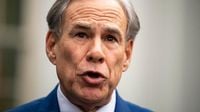The simmering political standoff over Texas’ redistricting plan has spilled far beyond the Lone Star State’s borders, igniting impassioned debate, interstate maneuvering, and a high-stakes test of American democracy. On Sunday, August 10, 2025, three Texas Democratic lawmakers—Barbara Gervin-Hawkins, Ron Reynolds, and Charlene Ward Johnson—stood before the congregation at Chicago’s St. Sabina Church, rallying support in their fight against what they called “racist gerrymandering.” Their presence in Illinois wasn’t just symbolic; it was the latest chapter in a dramatic exodus of nearly 50 Texas Democrats who fled their state to block a Republican-led redistricting plan that could shift five U.S. House seats to the GOP ahead of the pivotal 2026 midterm elections.
“What we’re fighting for is democracy,” declared Rep. Gervin-Hawkins to the Chicago faithful, as reported by WGN. Her words, heavy with the gravity of the moment, resonated throughout the church. “Who would think it’s OK to hunt us down like animals rather than to allow us to follow the rules?” she added, underscoring the tension and personal risk the lawmakers now face.
At the heart of this standoff lies a controversial redistricting map, engineered by the Texas Republican majority, that critics argue would dilute the voting power of Black and Latino communities. According to the Chicago Sun-Times, the plan could disenfranchise minority-majority districts and tip the balance of five U.S. House seats toward the GOP, potentially altering the national political landscape for years to come.
To prevent the map’s passage, the Democratic lawmakers took the extraordinary step of leaving Texas, thereby denying the state House the quorum required to conduct official business. As CNN reported, their absence has left the legislature in limbo for over a week, with no session able to proceed. The Republican majority, meanwhile, has scrambled to find ways around the impasse, even as the clock ticks down on the legislature’s special session.
Texas Governor Greg Abbott has responded with escalating pressure and legal threats. On Fox News Sunday, Abbott warned, “This could literally last years because in Texas, I’m authorized to call a special session every 30 days. And as soon as this one is over, I’m going to call another one. Then another one. Then another one. If they show back up in the state of Texas, they will be arrested and taken to the capital. If they want to evade arrest, they’re going to stay out of Texas for literally years.” His message was clear: the Democrats’ absence would not be tolerated, and the machinery of government would grind on until Republicans got their way.
Abbott’s threats weren’t just rhetorical. The Texas House approved civil arrest warrants for the missing lawmakers, and state troopers were deployed to search for their return. The situation became even more fraught when Senator John Cornyn enlisted FBI Director Kash Patel to help locate the absent Democrats, a move approved on August 7, 2025, according to SAN and CNN. The prospect of federal law enforcement involvement added another layer of national significance—and controversy—to the showdown.
Yet the Democrats have found unlikely allies and safe haven outside Texas. Illinois Governor JB Pritzker, appearing on NBC’s Meet the Press, denounced the Republican actions as violations of the Voting Rights Act and the Constitution. “They’re heroes, not just standing up for their constituents and the people of Texas, but also rights for all across the country,” Pritzker said, affirming Illinois’ role as a refuge for those he described as “today’s freedom fighters.” St. Sabina’s longtime pastor, Father Michael Pfleger, echoed this sentiment, telling his congregation, “They are teaching, I believe, the country a civic lesson right now. Don’t say you love democracy and not fight for it.”
But the exiled lawmakers have not been immune to pressure. According to multiple reports, including the Chicago Sun-Times, they have faced mounting threats, including two bomb threats at their residence in Illinois. Financial strain is also a growing concern: absent lawmakers are being fined $500 per day, and a state judge has temporarily barred a political group from raising funds to cover their expenses. By law, campaign and official funds cannot be used to pay these fines, leaving the Democrats in a precarious position as the standoff drags on.
The legal and political maneuvering has reached a fever pitch. Governor Abbott has asked the Texas Supreme Court to declare the position of Democratic Caucus head Gene Wu vacant, since he and other leaders are now out of state. Meanwhile, the Texas House is scheduled to meet again on Monday, August 11, 2025, with Republicans hoping enough Democrats will return to establish a quorum and finally advance the redistricting plan.
Nationally, the Texas standoff is being watched closely as a bellwether for redistricting battles in other states. California Governor Gavin Newsom announced plans for a November referendum on new district maps that could create up to five seats for Democrats, with proposed maps set to be unveiled this week. According to CNN, similar redistricting fights are brewing in Ohio, Indiana, and South Carolina, as both parties vie for an edge in the 2026 midterms and beyond.
The rhetoric has grown increasingly sharp on both sides of the aisle. Governor Abbott accused the Democrats of abandoning their oath of office and obstructing critical state business for “hardworking Texans.” On social media, he doubled down: “Texas Democrats didn’t stand and fight—they fled, obstructing critical state business for hardworking Texans.” New York Governor Kathy Hochul, in turn, called out what she saw as Republican hypocrisy, asking, “Where was the outrage when Donald Trump told Texas, ‘Go find me 5 more seats?’”
Amid all the grandstanding and legal threats, the underlying issue remains: who gets to draw the lines that determine political power for the next decade? For Texas Democrats, the answer is clear. As Rep. Gervin-Hawkins told the congregation at St. Sabina, “Your prayers will keep us strong.” For Republicans, the fight is about upholding the legislative process and, in their view, the will of the Texas electorate.
As the Texas House prepares for its next session, the outcome is anything but certain. Will Democrats hold the line and force further delays, risking arrest and financial ruin? Or will enough lawmakers return to allow the controversial map to pass? One thing is clear: the battle over redistricting in Texas is about far more than lines on a map. It’s a test of political will, legal boundaries, and the very meaning of representative democracy in America.
With the eyes of the nation watching, the next move belongs to the lawmakers—both those in exile and those waiting in Austin. The stakes, as every participant has made clear, could not be higher.




